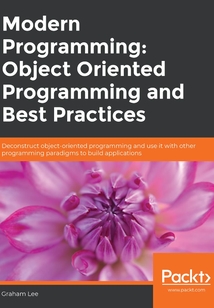舉報 

會員
Modern Programming: Object Oriented Programming and Best Practices
最新章節:
Conclusion
Discovertheuntappedfeaturesofobject-orientedprogramminganduseitwithothersoftwaretoolstocodefast,efficientapplications.KeyFeatures*Explorethecomplexitiesofobject-orientedprogramming(OOP)*DiscoverwhatOOPcandoforyou*LearntousethekeytoolsandsoftwareengineeringpracticestosupportyourownprogrammingneedsBookDescriptionYourexperienceandknowledgealwaysinfluencetheapproachyoutakeandthetoolsyouusetowriteyourprograms.Withasoundunderstandingofhowtoapproachyourgoalandwhatsoftwareparadigmstouse,youcancreatehigh-performingapplicationsquicklyandefficiently.Inthistwo-partbook,you’lldiscovertheuntappedfeaturesofobject-orientedprogramminganduseitwithothersoftwaretoolstocodefastandefficientapplications.ThefirstpartofthebookbeginswithadiscussiononhowOOPisusedtodayandmovesontoanalyzetheideasandproblemsthatOOPdoesn’taddress.ItcontinuesbydeconstructingthecomplexityofOOP,showingyouitsfundamentallysimplecore.You’llseethat,byusingthedistinctiveelementsofOOP,youcanlearntobuildyourapplicationsmoreeasily.Thenextpartofthisbooktalksaboutacquiringtheskillstobecomeabetterprogrammer.You’llgetanoverviewofhowvarioustools,suchasversioncontrolandbuildmanagement,helpmakeyourlifeeasier.Thisbookalsodiscussestheprosandconsofotherprogrammingparadigms,suchasaspect-orientedprogrammingandfunctionalprogramming,andhelpstoselectthecorrectapproachforyourprojects.Itendsbytalkingaboutthephilosophybehinddesigningsoftwareandwhatitmeanstobea"good"developer.Bytheendofthistwo-partbook,youwillhavelearnedthatOOPisnotalwayscomplex,andyouwillknowhowyoucanevolveintoabetterprogrammerbylearningaboutethics,teamwork,anddocumentation.Whatyouwilllearn*Untanglethecomplexityofobject-orientedprogrammingbybreakingitdowntoitsessentialbuildingblocks*RealizethefullpotentialofOOPtodesignefficient,maintainableprograms*Utilizecodingbestpractices,includingTDD,pairprogrammingandcodereviews,toimproveyourwork*Usetools,suchassourcecontrolandIDEs,toworkmoreefficiently*Learnhowtomostproductivelyworkwithotherdevelopers*BuildyourownsoftwaredevelopmentphilosophyWhothisbookisforThisbookisidealforprogrammerswhowanttounderstandthephilosophybehindcreatingsoftwareandwhatitmeanstobe“good”atdesigningsoftware.ProgrammerswhowanttodeconstructtheOOPparadigmandseehowitcanbereconstructedinaclear,straightforwardwaywillalsofindthisbookuseful.Tounderstandtheideasexpressedinthisbook,youmustbeanexperiencedprogrammerwhowantstoevolvetheirpractice.
目錄(138章)
倒序
- coverpage
- Modern Programming: Object Oriented Programming and Best Practices
- Preface
- About
- About the Book
- Part One – OOP The Easy Way
- Chapter 1 Antithesis
- Telling an Object What to Do
- Designing an Object
- Drawing an Object
- Opposing Functional Programming
- Capturing Elements of Reusable Design
- Finding a Method to Run
- Building Objects
- Conclusion to Part One
- Chapter 2 Thesis
- Objects Are Independent Programs
- The Open-Closed Nature of Independent Objects
- The Design of Independent Objects
- Constructing Independent Objects
- Working with Independent Objects
- Conclusion to Part Two
- Objects Are Independent Programs
- Objects Can Be Written Inspected And Changed in Context
- Put That All Together
- Conclusion to Part Three
- Part Two – APPropriate Behavior
- Chapter 4 Tools That Support Software Development
- Introduction
- Version Control/Source Code Management
- Continuous Integration and Deployment
- Build Management
- Bug and work tracking
- Integrated Development Environment
- Static Analysis
- Code Generation
- Chapter 5 Coding Practices
- Introduction
- Test-Driven Development
- Domain-Driven Design
- Behavior-Driven Development
- xDD
- Design by Contract
- Development by Specification
- Pair programming
- Code Reviews
- Programming Paradigms And Their Applicability
- Chapter 6 Testing
- Introduction
- A Philosophy of Testing
- Black and White Boxes
- Test Case Design
- Automate All The Things
- Getting Someone Else In
- Other Benefits Of Testing
- Chapter 7 Architecture
- Introduction
- Non-Functional Requirements Are Essential
- Defer When Appropriate; Commit When Necessary
- Justify Your Decisions
- When to Fix and When to Replace
- Know When to Nitpick And When to Leave It
- Support Don't Control
- Chapter 8 Documentation
- Introduction
- Documentation Is More Useful Than You Might Think
- The Up-To-Dateness Problem
- Automatically Generated Documentation
- Analysis Paralysis
- How to Document
- Summary
- Chapter 9 Requirements Engineering
- Study People
- You Shouldn't Necessarily Build What The Client Asks For
- Avoid Asking What You Want To Hear
- Understand The Problem Domain
- Uncover Tacit Requirements
- You Shouldn't Build What Your Client Wants
- Human Factors In Software Systems
- Prioritizing Requirements
- Is It Really "Engineering"?
- Chapter 10 Learning
- Introduction
- Do as Much as You Can
- Don't Stick to Your Own Discipline
- Put it into Practice
- Collaborate and Share what you Learn
- Opportunities to Learn
- Rediscovering Lost Knowledge
- The Teaching Of Software Creation
- Reflective Learning
- Chapter 11 Critical Analysis
- Introduction
- Criticism Is Often Uncritical
- How to Form an Argument?
- Forms Of Fallacy
- Further Reading on Arguments
- Debates and Programmers
- Software as Essays
- Chapter 12 Business
- Introduction
- Evaluate Risks Dispassionately
- Find Out What You Need to Know And How You Can Know It
- What You Discover May Not Be to Your Liking
- How to Interview A Programmer?
- Be Transparent and Honest with Your Business Partners
- Choose Appropriate Technology
- Manipulation and Inspiration
- You Don't Need to Be A Founder to Be A Programmer
- Chapter 13 Teamwork
- Introduction
- Focus versus Interruption
- Working Environment
- Prioritizing Work
- Tell Experts What Needs to Be Done
- Working with Junior Programmers
- Working with Managers
- Patterns of Software Project Management
- Negotiation
- Empathy
- Shared Language and Shiny Buzzwords
- Chapter 14 Ethics
- Introduction
- Examples of Ethical Codes
- Application of The Ethical Code
- Ethical Ambiguities
- Respecting Privacy
- Epilogue
- Chapter 15 Philosophy
- Introduction
- Software as A Pursuit
- An Economic Philosophy of Software
- A Management Philosophy of Software
- A Social Philosophy of Software
- A Pedagogic Philosophy of Software
- What Does It Mean to Be "Good" At Making Software?
- Conclusion 更新時間:2021-05-21 22:06:25
推薦閱讀
- 大數據技術基礎
- 數據可視化:從小白到數據工程師的成長之路
- 從零開始學Hadoop大數據分析(視頻教學版)
- 計算機信息技術基礎實驗與習題
- 企業大數據系統構建實戰:技術、架構、實施與應用
- 卷積神經網絡的Python實現
- 文本數據挖掘:基于R語言
- 云計算服務保障體系
- Access 2016數據庫技術及應用
- R數據科學實戰:工具詳解與案例分析(鮮讀版)
- 3D計算機視覺:原理、算法及應用
- 新基建:數據中心創新之路
- 科研統計思維與方法:SPSS實戰
- Splunk智能運維實戰
- Power BI智能數據分析與可視化從入門到精通
- Web Services Testing with soapUI
- 大數據分析:R基礎及應用
- 掌中寶:電腦綜合應用技巧
- Machine Learning for Mobile
- 數據時代的品牌智造
- 大數據用戶行為畫像分析實操指南
- 算法設計與問題求解(第2版):計算思維培養
- 云原生數據庫:原理與實踐
- Hands-On Design Patterns with Swift
- Hands-On Design Patterns with Java
- 一本書講透首席數據官:CDO知識體系與能力模型詳解
- 實用推薦系統
- 計算機應用基礎項目化教程(微課版)
- Python數據分析
- 企業級數據架構:核心要素、架構模型、數據管理與平臺搭建

